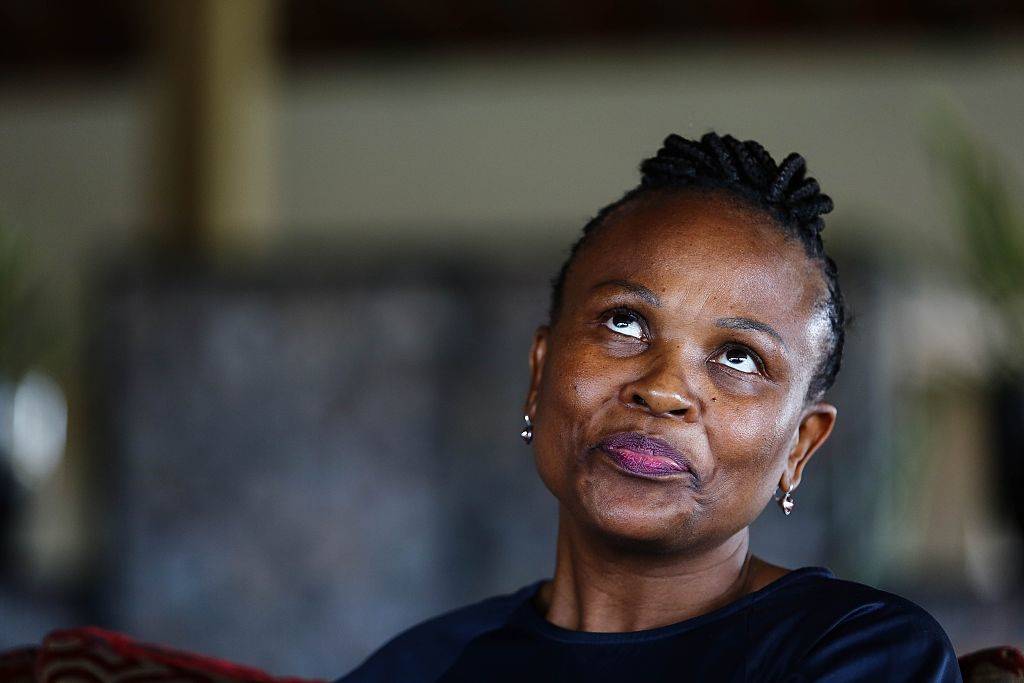The courts found that she doesn’t understand the law, she fails to act rationally and ignores evidence. And these findings are compounded by the SARB and Estina judgments. Her position is untenable, and she cannot survive, writes Pieter du Toit

The High Court has delivered some deeply damaging blows to Public Protector Busisiwe Mkhwebane over the last 24 months, but her latest legal Isandlwana, in which her report into President Cyril Ramphosa was set aside by the court in Pretoria, must now be the prelude to her departure from office.
The court has exposed Mkhwebane – and confirmed what many have been arguing for years – as professionally incompetent and politically partisan.
She, and her senior advisors and investigators, have shown a deep inability to understand what the extent and scope of her office’s powers are.
As legal practitioners, they have failed to apply laws and statutes correctly and they have shown a singular determination, notwithstanding evidence or lack thereof, to make findings which have deep political repercussions.
Mkhwebane has suffered defeats in every single one of the major reviews that have gone to court, and by big margins too. These findings have been overwhelming in their reasoning and devastating in their rhetoric.
And all of them related to foundational, structural and institutional failures under Mkhwebane’s leadership.
They have all served to severely weaken the Office of the Public Protector.
Her very first foray into politically contentious investigations – the infamous SA Reserve Bank, Absa and Bankorp matter – ended in abject defeat, with the court slamming her for exceeding the bounds of her power.
When she sanitised the investigation into the Estina dairy farm, in which she absolved powerful politicians, the court ordered her to reopen the probe.
And all these courts’ findings were upheld in the appeals process too.
‘Flawed due to an error of law’
The court has considered, and now very much pronounced, on her incompetence and has also questioned her motivation for making findings – because in the Ramaphosa matter she discarded evidence in front of her, and even made findings in its absence.
On the issue of Ramaphosa’s “misleading of Parliament”, the court said: “The Public Protector’s finding on the misleading of Parliament is fatally flawed due to an error of law. It is difficult to understand how the president’s answer could rationally be viewed as anything but honest and reasonable, given the nature of [Mr [Mmusi] Maimane’s question.”
About donations to the Ramaphosa campaign for the ANC presidency, the court found: “We conclude that the findings of the Public Protector on the disclosure issue are unsustainable. Rational findings must be premised on a proper factual and legal foundation. That foundation was lacking in this case.”
And about the findings of money laundering, the court explained: “The conclusion is inescapable that, in dealing with this issue, the Public Protector completely failed to properly analyse and understand the facts and evidence at her disposal. She also showed a complete lack of basic knowledge of the law and its application.”
The courts found that she doesn’t understand the law, she fails to act rationally and ignores evidence. And these findings are compounded by the SARB and Estina judgments. Her position is untenable, and she cannot survive.
The Public Protector was considered a moribund institution until Thuli Madonsela, a noted legal practitioner and scholar, was appointed to that office in 2009.
With the capture of institutions and their subsequent failure to execute justice and oversight between 2009 and 2018, the Public Protector became the very last outpost of accountability.
Just desserts
The failings of Parliament, the police, the Hawks, the National Prosecuting Authority and other law enforcement institutions put unbearable – and unfair – pressure on the Public Protector.
But she managed to navigate a treacherous political environment, with the law and Constitution as her sole focus, which meant that incendiary investigations into Nkandla and state capture stood up to the white-hot scrutiny of populism and politics.
The Public Protector, modelled on the German ombudsman, wasn’t designed to function as it did under Madonsela.
But it was forced into the role of the final – and only – guarantor of accountability and justice by the pervading creep of corruption under then president Jacob Zuma and the ANC.
Since Zuma’s departure, the painfully slow process of recapture and restoration has started, with the NPA, being the site of enormous efforts to ensure institutional recovery and sustainability.
The Public Protector has an important role to play within the constitutional architecture which, in concert with other bodies, seeks to ensure justice.
If the office is compromised by incompetence and politics, as it is now, it weakens the whole system.
And, in a system already subdued by criminality and corruption, it could be fatal.
Our system has never had to facilitate the premature departure of a Public Protector, although in 2008 and 2009 a protracted parliamentary process led to the resignation of a sitting national Director of Public Prosecutions.
The parliamentary process to investigate Mkhwebane’s fitness to hold office has commenced.
She has applied to the Western Cape High Court to stop it, but this will in all probability fail.
The removal of Mkhwebane, found by the courts to be ill-suited for her job, should be swift and ruthless.

